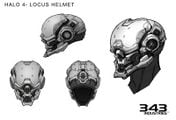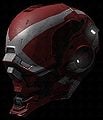LOCUS-class Mjolnir: Difference between revisions
From Halopedia, the Halo wiki
(→Trivia) |
(→Trivia) |
||
| Line 42: | Line 42: | ||
*In Halo 4, Locus is one of four helmet-only armor sets alongside the [[Deadeye]], [[Scanner]], and [[Strider]] helmets. | *In Halo 4, Locus is one of four helmet-only armor sets alongside the [[Deadeye]], [[Scanner]], and [[Strider]] helmets. | ||
*The head of a [[Destinypedia:Thrall|Hive Thrall]] (an enemy from [[Bungie]]'s game ''[[Destinypedia:Destiny|Destiny]]''), bears a striking resemblance to the Locus armor's helmet. | *The head of a [[Destinypedia:Thrall|Hive Thrall]] (an enemy from [[Bungie]]'s game ''[[Destinypedia:Destiny|Destiny]]''), bears a striking resemblance to the Locus armor's helmet. | ||
*In both ''[[Halo 4]]'' and ''[[Halo: The Master Chief Collection]]'', the | *In both ''[[Halo 4]]'' ¨full set¨ images and ''[[Halo: The Master Chief Collection]]'', the LOCUS body is the same as the [[RECRUIT-class Mjolnir|Recruit armor]]. | ||
*The body of the Locus armor in ''Halo 5: Guardians'' is the same as the [[AVIATOR-class Mjolnir|Aviator armor]]. | *The body of the Locus armor in ''Halo 5: Guardians'' is the same as the [[AVIATOR-class Mjolnir|Aviator armor]]. | ||
Revision as of 22:25, September 28, 2016
Template:Armor Infobox Template:Article Quote LOCUS-class Mjolnir is a variant of the MJOLNIR Powered Assault Armor [GEN2] manufactured by Lethbridge Industrial.[1]
Overview
The LOCUS helmet has a heavily armored case-locked visor system that relies on multiple visual feeds. It also has an interlocking helmet soft-mesh loosely based on Covenant armor technology, and R4-100 dial audio sensors used for noise tracking.[2]
Development history
The Locus variant was manufactured by Lethbridge Industrial. Tested at the Lethbridge Combat Fields, the armor system is a contemporary stealth kit conceived specifically for tactical and strategic infiltration with focus on survivability and durability. Despite its exotic design, the primary differential from similar systems is its incredible durability in the field.[3][2]
Lethbridge also tested the armor for both resiliency and its attention to stealth and anti-security measures outside the megacity of Lethbridge on Concord in a number of heavily secured facilities lying across Corsica's hardscrabble northern outskirts. These tests confirmed that Locus was fully able to survive extreme opposition and firepower.[2]
Usage
Most operators choose this suit due to its resiliency.[1]
In-game information
Halo 4
Unlock: The helmet was a pre-order bonus through MightyApe.co.nz or HMV.com. It is also available in the Halo 4 Game of the Year Edition.
- Description: Despite its exotic design, most operators select this armor based on its resiliency.
Halo 5: Guardians
Unlock: Legendary REQ card
- Helmet description: The LOCUS' passive cyberintrusion package and battlenet cache allows the user to stay aware of the strategic situation while remaining invisible to any hackers in the network.
- Armor description: Designed to provide an answer to threats arising during assaults on heavily defended tactical nodes, the grim visage of LOCUS armor is a common sight among Spartan boarding parties and special responses teams.
Available Skins: Edge
Edge Unlock: Legendary REQ card
Trivia

|
Browse more images in this article's gallery page. |
- In Halo 4, Locus is one of four helmet-only armor sets alongside the Deadeye, Scanner, and Strider helmets.
- The head of a Hive Thrall (an enemy from Bungie's game Destiny), bears a striking resemblance to the Locus armor's helmet.
- In both Halo 4 ¨full set¨ images and Halo: The Master Chief Collection, the LOCUS body is the same as the Recruit armor.
- The body of the Locus armor in Halo 5: Guardians is the same as the Aviator armor.
Gallery
Concept art of the LOCUS armor for Halo 4.
- LOCUS Helmet.jpg
Concept art of the Locus helmet and skin.
- MJOLNIR LOCUS.png
A Spartan-IV using the Locus helmet.
- LOCUS Flag.png
A Spartan-IV wearing the Locus helmet on Solace.
List of appearances
- Halo 4 (First appearance)
- Halo 5: Guardians
Sources





